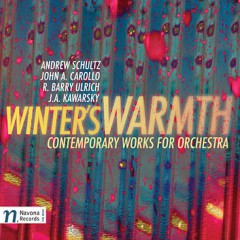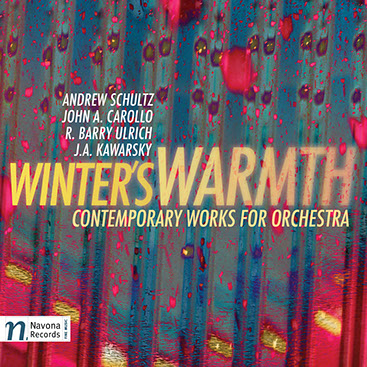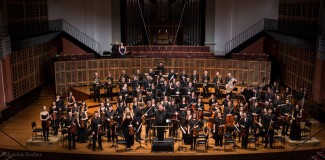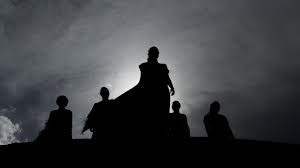Andrew Schultz “Falling Man, Dancing Man” Featured On A New Release From Navona

An engaging new work by Sydney based Australian composer Andrew Schultz has been included on a recently released album, Winter’s Warmth, by the American label, Navona.
Schultz’s Falling Man, Dancing Man (opus 68) is a three-movement concerto for orchestra and solo pipe organ. It was commissioned by Symphony Australia and written and premiered in 2005 by the Melbourne Symphony Orchestra conducted by Oleg Caetani at the Melbourne Town Hall with Calvin Bowman at the organ. Despite a positive review in The Age, Falling Man, Dancing Man has seemingly not been performed since. This recording presents a fine opportunity for the piece to be extended in time and reach.
For Schultz, the impetus to write this piece was visual. Two powerful and contrasting photographs from pivotal moments in the 20th century transcending hemispheres, continents and decades, represented to him, two different contexts of war – one of increasing threat, the other, the removal of threat. To one, the response was of courageous self-determination (or helpless acquiescence); to the other, jubilation.
The first image was the poignant scene of the ‘Falling Man’ taken as the unknown man threw himself from the smoking North Tower of the World Trade Centre during the 2001 attacks and later depicted in promotions for the popular TV series Mad Men. The second image is ‘Dancing Man’, another unknown individual who is celebrating in a Sydney street at the end of World War Two.
Says Schultz in the liner notes for the album, “The more I looked into it the more I became aware that images and artwork depicting falling and dancing bodies are almost universal icons from rock art to the present. Perhaps this is because they depict fundamental truths about human experience. Whilst echoes of both these and other images have found their way into the piece, the musical matters took their own course in the work and in the end the organist’s dancing feet and physical elevation in the organ loft also seemed apt for the title.”
Falling Man, Dancing Man is one of four works on Winter’s Warmth which features three other contemporary American composers – Let Freedom Ring and The Transfiguration of Giovanni Baudino by John A Carollo, Barry Ulrich’s Russian Winter and Episodes by J A Kawarsky. It was recorded by the Moravian Philharmonic Orchestra conducted by Petr Vronsky with organist Karel Martínek in September 2013 at the Dům Kultury, a cultural centre in Ostrava, Czech Republic.
The four pieces explore many ideas but are united in their acknowledgement of the human spirit. The title of the album derives from Albert Camus’ observation that “In the depth of winter, I finally learned that within me there lay an invincible summer.”
Clive O’Connell in his review for The Age describes Infinity Jinx, the first movement of Falling Man, Dancing Man, as “a blues-influenced sequence, the organ an insistent pattern-maker exploding into a central solo before returning to the naggingly off-centre rhythm;” the second movement Deep Crossing as “a slow-moving lyricism that rises to powerful activity before the final moving bars featuring an ostinato xylophone that speaks of an ominous inevitability;” and the third movement The Laughing Man as “muffled high spirits; here, the organ comes into its virtuosic own. ….(the work’s) building blocks small in proportions but cogently layered.”
Born in Adelaide in 1960, Andrew Schultz’s credentials are impressive. He is Professor of Music and of Head of School of the Arts and Media at the University of New South Wales in Sydney. His early tertiary studies in music were followed by postgraduate studies at King’s College, London, the University of Pennsylvania and a PhD from the University of Queensland. His teachers and mentors include George Crumb, David Lumsdaine and Luciano Berio. Professor Schultz has won numerous awards and prizes in Australia and overseas, including Australia Council Composer Fellowships, a Fulbright Award, a Commonwealth Scholarship and Fellowship Plan Award, the APRA Award for Classical Music, the 2009 Paul Lowin Song Cycle Prize and the Schueler Composition Award. Amongst his many posts and residencies around the world, Schultz has held the position of Head of Composition at London’s Guildhall School of Music, Professor of Composition at the University of Wollongong and Visiting Artist at the Banff Centre for the Arts in Canada and Cité des Arts, Paris.
Schultz has been commissioned by numerous ensembles and his writing has enriched the Australian canon significantly with both small- and large-scale works for solo instruments, chamber, orchestra, operatic and vocal ensembles. He has an impressive discography and his opera The Children’s Bach has been presented on film. Whilst his experience has been international, Schultz’s writing represents the Australian story to be told by Australian performers.
Winter’s Warmth is available on CD and in digital format from Navona Records Catalogue number NV6091.
.






